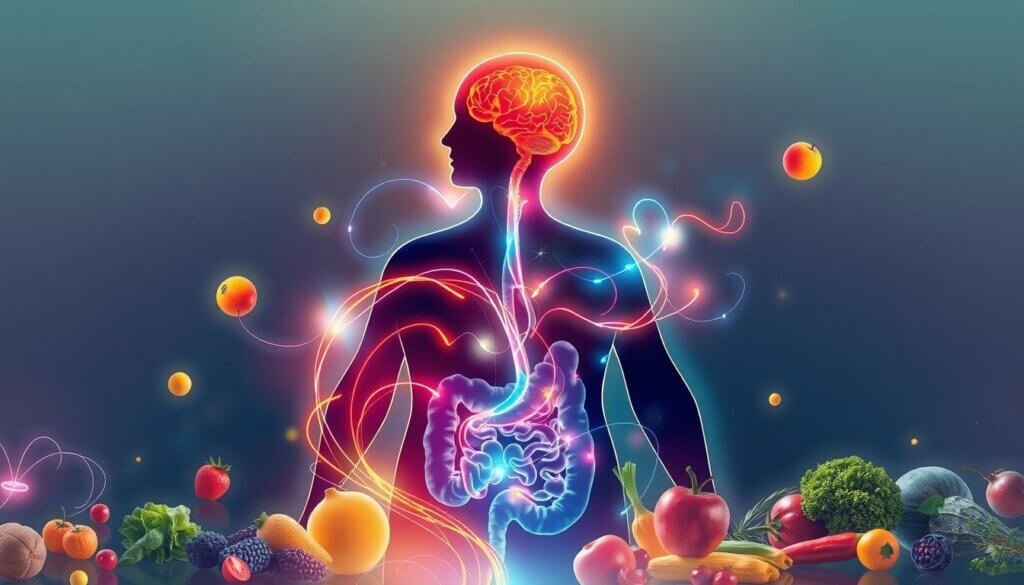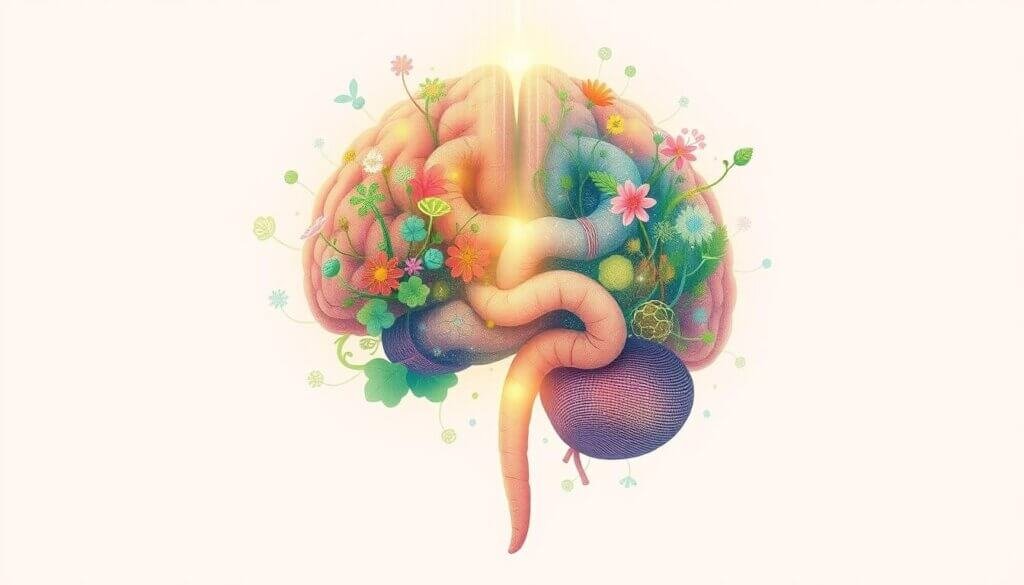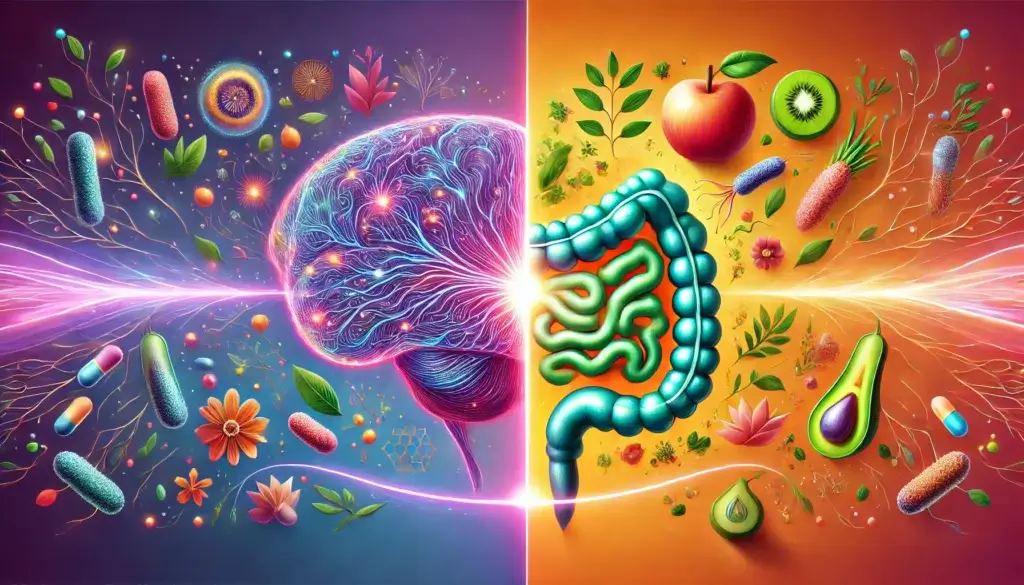Did you know that 90% of the body’s serotonin is made in the gut? This shows how much your gut health affects your mood. The gut and brain talk to each other, influencing your feelings and thinking.

Learning about this connection can help you improve your mental health. We’ll explore how to keep your gut healthy for a happier life. This article will dive into the science and offer practical tips.
Key Takeaways
- The gut and brain are intimately connected through the gut-brain axis, a bidirectional communication system.
- Gut health has a significant impact on mood, mental well-being, and cognitive function.
- Maintaining a healthy, diverse gut microbiome is crucial for optimal mental health.
- Certain dietary and lifestyle choices can support gut-brain health and improve your overall mood.
- Addressing gut imbalances and inflammation can help alleviate mental health concerns.
Understanding the Gut-Brain Axis: A Two-Way Communication System
The gut-brain axis is a complex network between your digestive system and brain. It’s key to your mental health and well-being. Learning about this connection can show how a healthy gut affects your emotions and mood.
The Role of the Vagus Nerve
The vagus nerve is at the heart of the gut-brain axis. It’s a vital nerve that lets your gut and brain talk to each other. It helps control digestion, heart rate, and emotions.
Neurotransmitter Production in the Gut
Most of your body’s neurotransmitters, like serotonin, are made in the gut. These chemicals help your gut talk to your brain and affect your mood. Keeping your gut healthy helps make these important chemicals better.
How Gut Signals Influence Brain Function
The gut-brain axis works both ways. Your gut can send signals to your brain, changing how you think and feel. At the same time, your brain can affect your gut, showing how closely they’re connected.
Understanding the gut-brain axis is the first step to better mental health. By taking care of your gut, you can boost your mood, reduce anxiety, and improve your thinking.
How Your Microbiome Affects Mental Well-being
Your gut microbiome is a community of bacteria in your digestive system. It’s key to your mental health. The balance between good and bad bacteria affects your mood and emotions.
Beneficial vs. Harmful Gut Bacteria
A healthy gut has more good bacteria, like Lactobacillus and Bifidobacterium. These help make neurotransmitters like serotonin and dopamine. These are important for mood and emotions. On the other hand, too much bad bacteria can cause mental health problems.
The Impact of Dysbiosis on Mood
- Dysbiosis is linked to depression, anxiety, and mood disorders.
- An imbalance in gut bacteria can cause inflammation. This can harm brain function and balance.
- Toxins from bad bacteria can mess with brain signals, causing mood issues.
Inflammation and Mental Health
Chronic inflammation from an unhealthy gut microbiome is linked to mental health issues. Inflammation can affect the brain, leading to mood disorders.
Keeping your gut microbiome healthy supports your mental well-being. Eating probiotic-rich foods, reducing stress, and living a healthy lifestyle can help. These actions promote a balanced gut and better mental health.

Nutrition Strategies for Optimal Gut-Brain Health
Keeping your gut microbiome healthy is key for your mental health. Eating foods that heal your gut can boost your mood and brain function. Let’s look at some nutrition tips to strengthen the gut-brain link.
Embrace Prebiotic-Rich Foods
Prebiotics feed the good bacteria in your gut. Add these foods to your meals:
- Onions, garlic, and leeks
- Whole grains, such as oats and barley
- Apples, bananas, and other fruits rich in fiber
- Legumes, including beans, lentils, and chickpeas
Prioritize Probiotic-Packed Options
Probiotics are live bacteria and yeasts that balance your gut. Eat these foods to heal your gut:
- Yogurt and kefir
- Fermented vegetables, like sauerkraut and kimchi
- Kombucha and other fermented beverages
- Tempeh and miso
| Nutrient | Function | Food Sources |
|---|---|---|
| Omega-3 Fatty Acids | Reduce inflammation and support brain health | Fatty fish, walnuts, flaxseeds |
| Vitamin D | Regulate mood and cognitive function | Fatty fish, egg yolks, fortified foods |
| Magnesium | Promote relaxation and stress management | Leafy greens, nuts, seeds, whole grains |
Eating mental health gut healing foods daily can help improve your mood and overall health.
“A healthy gut is the foundation for a healthy mind.”

Lifestyle Factors That Impact Your Gut-Brain Connection
Your daily habits and lifestyle choices are key to a healthy gut-brain axis. This is vital for your mental well-being. Stress, sleep, and exercise greatly affect your gut microbiome balance. This, in turn, impacts mood disorders and the serotonin gut-brain connection.
Chronic stress can harm gut-brain communication, causing inflammation and an imbalance of gut bacteria. Using stress-management techniques like meditation, yoga, or deep breathing can help. These practices support your mental health by restoring balance in your gut-brain network.
Also, quality sleep is crucial for gut-brain health. Not getting enough sleep can lead to an imbalance in your gut microbiome. Try to sleep 7-9 hours each night. This helps your body’s natural rhythms and supports a strong gut-brain connection.
Looking for more tips and insights? Explore our other articles in our Fitness blog!
FAQ
How does gut health impact mental health and mood?
Your gut and brain are closely linked through the gut-brain axis. A healthy gut microbiome can boost brain function and mood. On the other hand, an imbalance in gut bacteria, or dysbiosis, is linked to mood disorders and emotional distress.
What is the role of the vagus nerve in the gut-brain connection?
The vagus nerve is a key part of the gut-brain axis. It sends signals back and forth between the gut and brain. This neural pathway lets the gut share information about digestion and inflammation with the brain, affecting mood and cognitive function.
How do gut bacteria produce neurotransmitters that affect the brain?
Gut bacteria can make neurotransmitters like serotonin, dopamine, and GABA. These neurotransmitters are key for mood, behavior, and thinking. The gut microbiome’s role in making these neurotransmitters is crucial for the gut-brain connection.
What is the impact of gut inflammation on mental health?
Chronic gut inflammation, often due to an imbalance in gut bacteria, can cause systemic inflammation. This inflammation can harm the brain, leading to mood disorders, anxiety, and depression.
What are some nutrition strategies for supporting a healthy gut-brain connection?
Eating foods rich in prebiotics and probiotics, like fermented veggies and yogurt, can help your gut microbiome. Also, make sure to get enough omega-3 fatty acids, vitamins C and D, and polyphenols. These nutrients support gut-brain health.
How do lifestyle factors like stress and sleep affect the gut-brain axis?
Stress and poor sleep can harm your gut microbiome, causing inflammation and neurotransmitter imbalances. Good sleep, exercise, and stress management, like meditation, can strengthen the gut-brain connection and improve mental health.

